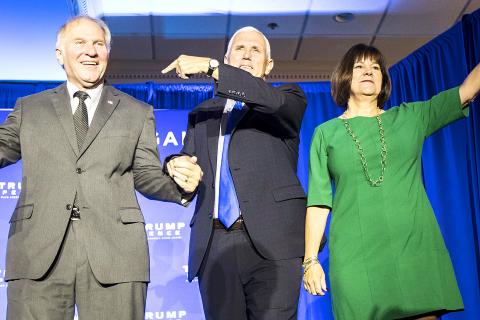A bill that seeks to encourage visits between Taiwan and the US at all levels was on Thursday passed by a US House of Representatives subcommittee in the first step toward its legislation.
The US House of Representatives Foreign Affairs Subcommittee on Asia and the Pacific unanimously passed the Taiwan travel act bill, which was initiated by US Representative Steve Chabot, and cosponsored by US representatives Brad Sherman and Ed Royce, chairman of the US House Committee on Foreign Affairs.
“The United States government should encourage visits between the United States and Taiwan at all levels,” the bill states.

Photo: AP
It says that since the enactment of the Taiwan Relations Act (TRA) in 1979, ties between Taiwan and the US have suffered from insufficient high-level communication due to the self-imposed restrictions that the US maintains on visits by high-ranking officials.
The bill, which seeks to eliminate the restrictions, is to be sent to the US House Committe on Foreign Affairs for approval.
A similar bill with the same title was also introduced to the US Senate. It was initiated by Republican senators Marco Rubio, Jim Inhofe and Cory Gardner; and Democratic senators Sherrod Brown, Bob Menendez and Gary Peters.
Before the bill can become law, it must be passed by both the House and Senate, then signed by US President Donald Trump.
President Tsai Ing-wen (蔡英文) yesterday expressed her appreciation to US officials, including US Secretary of State Rex Tillerson, for their support of Taiwan.
“Over past few days, we’ve seen US officials, including SecState Tillerson, speak in support of #TaiwanRelationsAct & Taiwan-US relations,” Tsai tweeted.
Tillerson told a US House committee hearing that while the US remains committed to its “one China” policy, it fully intends to fulfill all commitments to Taiwan under the TRA.
The TRA is a US law under which the US is committed to provide Taiwan with defensive weapons.
Tsai also expressed appreciation for the subcommittee’s unanimous passage of the bill.
“Taiwan appreciates continued support of friends in US, Japan & others, & will continue to work together for peace & stability in region,” Tsai tweeted.
The US allows authoritarian Chinese leaders to visit Washington at any time and gives them a red-carpet welcome, but has shunned democratically elected leaders from its long-term friend Taiwan, Washington-based Formosan Association for Public Affairs (FAPA) president Peter Chen (陳正義) said in a news release.
Only Washington, not Beijing, has the right to decide who can visit the US, Chen said.
With relatively new governments in office in Taiwan and the US, it is an opportune time to change the rules on visits by Taiwanese officials, he said.

NATIONAL SECURITY THREAT: An official said that Guan Guan’s comments had gone beyond the threshold of free speech, as she advocated for the destruction of the ROC China-born media influencer Guan Guan’s (關關) residency permit has been revoked for repeatedly posting pro-China content that threatens national security, the National Immigration Agency said yesterday. Guan Guan has said many controversial things in her videos posted to Douyin (抖音), including “the red flag will soon be painted all over Taiwan” and “Taiwan is an inseparable part of China,” while expressing hope for expedited “reunification.” The agency received multiple reports alleging that Guan Guan had advocated for armed reunification last year. After investigating, the agency last month issued a notice requiring her to appear and account for her actions. Guan Guan appeared as required,

Japan and the Philippines yesterday signed a defense pact that would allow the tax-free provision of ammunition, fuel, food and other necessities when their forces stage joint training to boost deterrence against China’s growing aggression in the region and to bolster their preparation for natural disasters. Japan has faced increasing political, trade and security tensions with China, which was angered by Japanese Prime Minister Sanae Takaichi’s remark that a Chinese attack on Taiwan would be a survival-threatening situation for Japan, triggering a military response. Japan and the Philippines have also had separate territorial conflicts with Beijing in the East and South China

A strong cold air mass is expected to arrive tonight, bringing a change in weather and a drop in temperature, the Central Weather Administration (CWA) said. The coldest time would be early on Thursday morning, with temperatures in some areas dipping as low as 8°C, it said. Daytime highs yesterday were 22°C to 24°C in northern and eastern Taiwan, and about 25°C to 28°C in the central and southern regions, it said. However, nighttime lows would dip to about 15°C to 16°C in central and northern Taiwan as well as the northeast, and 17°C to 19°C elsewhere, it said. Tropical Storm Nokaen, currently

PAPERS, PLEASE: The gang exploited the high value of the passports, selling them at inflated prices to Chinese buyers, who would treat them as ‘invisibility cloaks’ The Yilan District Court has handed four members of a syndicate prison terms ranging from one year and two months to two years and two months for their involvement in a scheme to purchase Taiwanese passports and resell them abroad at a massive markup. A Chinese human smuggling syndicate purchased Taiwanese passports through local criminal networks, exploiting the passports’ visa-free travel privileges to turn a profit of more than 20 times the original price, the court said. Such criminal organizations enable people to impersonate Taiwanese when entering and exiting Taiwan and other countries, undermining social order and the credibility of the nation’s